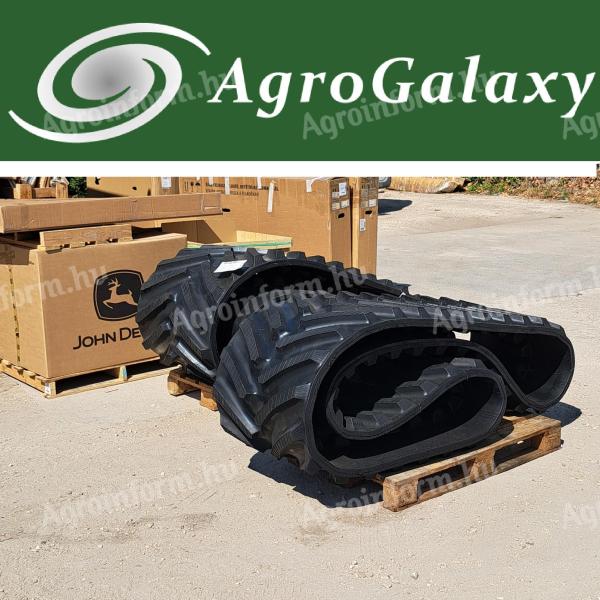Aftermarket agricultural rubber belts at Agrogalaxy
 BUDAPEST, 1043 Budapest (IV. kerület)
BUDAPEST, 1043 Budapest (IV. kerület)
 3
3
| Condition |
New |
| Quantity offered for sale (pieces) |
10 |
| Factory / aftermarket |
Aftermarket |
Description
High quality aftermarket agricultural rubber slings from the USA in the Agrogalaxy webshop! For New Holland, John Deere, CLAAS tractors and combines.
Tire springs are becoming increasingly popular on agricultural machinery such as tractors and combines. They offer many advantages over steel chain solutions.
Advantages
Reduced soil compaction:
Rubber straps provide a larger contact surface with the soil, which reduces pressure on the soil, especially on wet, soft soils. This results in less soil compaction and better soil structure, which can promote plant growth.
Better traction:
Rubber belts provide excellent traction in a variety of soil conditions, including mud, snow and sloped areas. This results in more efficient work, especially in difficult conditions.
Less soil erosion:
In addition to less soil compaction, rubber belts also reduce soil erosion by distributing weight more evenly, which can be important for soil protection.
Improved traction and stability:
Machines with rubber springs are more stable on slopes and uneven terrain. Power transmission is more efficient, so traction can also be improved, especially in difficult conditions.
More comfortable driving:
Rubber springs provide a smoother ride, especially on rough, uneven terrain, as they absorb vibrations, making the machine more comfortable to handle and reducing wear and tear on the machine.
Lower fuel consumption:
Because rubber springs provide less resistance on soft ground and better traction, this can result in lower fuel consumption in certain conditions.
Disadvantages
Higher purchase cost:
Rubber belt systems can be significantly more expensive than conventional wheeled machines or steel tracked machines. Initial investment is more expensive.
Maintenance costs and lifetime:
Rubber slings are more susceptible to mechanical damage, such as cuts and tears caused by sharp objects, stones or field debris. Their lifespan is generally shorter than steel chain slings and they can be more expensive to replace.
Less effective on dry, hard ground:
On dry, hard ground, such as hard-packed soil, the grip of rubber belts may be weaker, which can reduce efficiency and increase fuel consumption.
Complex maintenance:
Rubber springs require special maintenance, which can be time consuming and costly. They require regular inspection for cracks, wear and tension.
They require regular maintenance and frequent inspection and repair. speed and manoeuvrability:
Rubber-spring machines can generally be slower than their wheeled counterparts, especially on long, straight stretches of road. They may also turn more slowly, requiring more attention in tight spaces.
Overall, rubber-spring systems are excellent where ground protection, better traction and stability are key. For machines such as tractors and combine harvesters, rubber springs allow efficient operation in difficult ground conditions. However, higher costs, maintenance requirements and shorter service life have to be taken into account, which can affect their economic viability.
Identifier: 7443456
Updated: 22 January 2025 at 12:56:16 CET


















